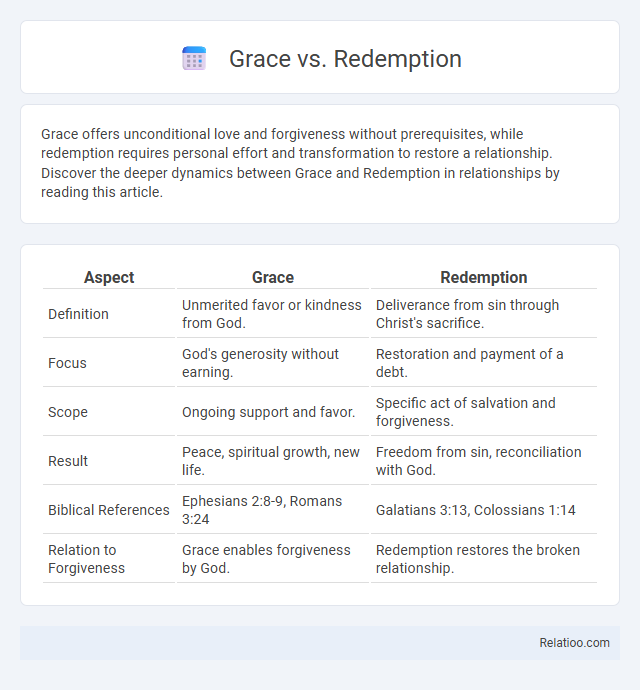Grace offers unconditional love and forgiveness without prerequisites, while redemption requires personal effort and transformation to restore a relationship. Discover the deeper dynamics between Grace and Redemption in relationships by reading this article.
Table of Comparison
| Aspect | Grace | Redemption |
|---|---|---|
| Definition | Unmerited favor or kindness from God. | Deliverance from sin through Christ's sacrifice. |
| Focus | God's generosity without earning. | Restoration and payment of a debt. |
| Scope | Ongoing support and favor. | Specific act of salvation and forgiveness. |
| Result | Peace, spiritual growth, new life. | Freedom from sin, reconciliation with God. |
| Biblical References | Ephesians 2:8-9, Romans 3:24 | Galatians 3:13, Colossians 1:14 |
| Relation to Forgiveness | Grace enables forgiveness by God. | Redemption restores the broken relationship. |
Understanding the Concepts: Grace and Redemption
Grace represents unmerited favor and divine assistance given freely by God, emphasizing forgiveness without requiring personal merit. Redemption refers to the act of being saved from sin or evil, often involving a sacrifice or price paid to restore a relationship with the divine. Understanding these concepts highlights grace as the foundation of God's love, while redemption is the process that secures believers' salvation through Christ's atoning work.
Biblical Foundations of Grace and Redemption
Grace represents God's unmerited favor toward humanity, rooted in biblical passages such as Ephesians 2:8, which highlights salvation as a gift through faith, not works. Redemption, emphasized in scriptures like Ephesians 1:7, refers to the act of Christ's sacrifice redeeming believers from sin and its consequences, portraying a transactional restoration. Your understanding of these concepts deepens by recognizing grace as the divine enablement to receive redemption, forming the foundational basis of Christian salvation theology.
Key Differences Between Grace and Redemption
Grace refers to the unmerited favor and love bestowed by God upon humanity, while redemption signifies the act of being saved or freed from sin through Christ's sacrifice. Grace is a continuous, unconditional gift that empowers believers to live righteously, whereas redemption is a definitive event marking the payment for sins and the believer's reconciliation with God. The primary difference lies in grace as the sustaining spiritual support and redemption as the transformative process that restores the sinner's relationship with God.
The Role of Faith in Grace and Redemption
Faith plays a central role in both grace and redemption, serving as the means through which individuals receive divine favor and forgiveness. Grace is understood as the unmerited gift from God, accessible only through sincere faith, while redemption requires faith to accept the sacrifice that restores the believer's relationship with God. The transformative power of grace and redemption manifests when faith activates God's promises, leading to spiritual renewal and salvation.
Grace: Unmerited Favor Explained
Grace represents unmerited favor, a divine gift granted without earning or deserving it, distinguishing it from redemption, which involves being saved from sin or error through sacrifice or payment. Unlike redemption, which often implies a transactional process, grace embodies unconditional acceptance and kindness from God. Your understanding of grace deepens spiritual growth by emphasizing reliance on divine mercy rather than personal merit.
Redemption: The Path to Salvation
Redemption is the transformative journey by which Your sins are forgiven through faith and repentance, offering a direct path to salvation and eternal life. Unlike grace, which is the unmerited favor from God given freely, redemption emphasizes active participation in seeking forgiveness and restoration. Understanding redemption as the key to salvation highlights the importance of accepting Christ's sacrifice to reconcile with God and secure spiritual renewal.
How Grace and Redemption Interact
Grace functions as the unmerited favor bestowed upon individuals, providing forgiveness and blessings without requiring prior merit. Redemption involves the act of being saved or delivered from sin or its consequences, often seen as the result of grace in Christian theology. Together, grace initiates the possibility of redemption by offering divine mercy, enabling individuals to be redeemed and restored to a right relationship with God.
Grace and Redemption in Daily Life
Grace in daily life embodies unearned kindness and forgiveness extended toward others, fostering empathy and patience in relationships. Redemption reflects the process of personal transformation, where individuals recover from past mistakes through sincere effort and positive change. Both concepts intertwine to encourage growth and healing, promoting a compassionate and hopeful approach to human imperfections.
Theological Debates: Grace vs. Redemption
Theological debates surrounding grace versus redemption often center on the nature and mechanics of salvation within Christian doctrine. Grace is understood as the unmerited favor from God granting believers forgiveness and divine assistance, while redemption refers to the deliverance from sin and its consequences through Christ's sacrificial atonement. Conflicts arise in interpretations regarding whether salvation is solely an act of grace or if redemption necessitates human cooperation and faith as essential components.
Embracing Grace and Redemption Today
Embracing grace and redemption today transforms lives by offering unconditional forgiveness and renewed hope, empowering individuals to overcome past mistakes. Grace represents unmerited favor, while redemption involves reclaiming worth through change and restitution. Together, these concepts foster spiritual growth, emotional healing, and meaningful personal transformation.

Infographic: Grace vs Redemption
 relatioo.com
relatioo.com